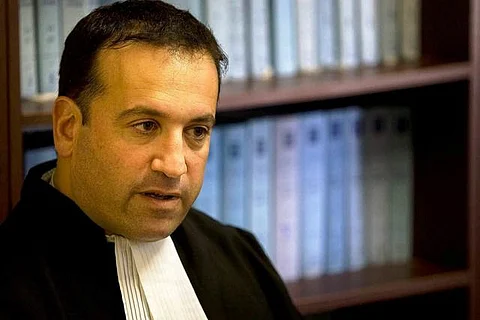
- NEWS
- the EDIT
- COMMENTARY
- BUSINESS
- LIFE
- SHOW
- ACTION
- GLOBAL GOALS
- SNAPS
- DYARYO TIRADA
- MORE

Former president Rodrigo Duterte’s lead counsel, Nicholas Kaufman, has denied claims that their camp’s requested restrictions on the identification process for victims participating in the International Criminal Court’s (ICC) investigation into the drug war.
In an interview on Tuesday (The Hague time), Kaufman also accused human rights lawyers Joel Butuyan and Kristina Conti of lying.
“Well, this whole thing about the judges rejecting my proposal, that never happened. All that happened was that there were two activists victims’ representatives by the names of Joel Butuyan and Kristina Conti, who made all sorts of assertions in the press that I had asked to restrict victims participation in the process by limiting the ID documents that could be used. That never happened,” he said.
He added: “All I was doing was relying on what the Philippines Social Security System requires for ID to be verified in the Philippines.”
Kaufman was referring to their camp’s “observations” which they submitted to the ICC’s Victims Participation and Reparations Sector (VPRS), a section in the international tribunal that is responsible for assisting victims in participating in proceedings and applying for reparations if a conviction occurs.
“So, this is not a question of the judges rejecting something that the defense asked for. This is the response that the defense made to the VPRS, which is the internal court unit, which is responsible for assessing victims applications,” he said.
“That's all we did, we made observations. We didn't make a request which was rejected. That's a big lie,” he added.
Earlier this week, Butuyan and Conti, who are both ICC-accredited lawyers, applauded the international tribunal’s decision to deny the alleged request of Duterte’s camp to restrict identity documents for participating victims in the drug war.
According to Conti, the ICC’s Pre-Trial Chamber 1 ruled against limiting identification documents to national IDs and passports, which many of the alleged victims lacked.
This was echoed by Butuyan in a separate statement, who also questioned the need for Duterte’s camp to ask for IDs now when they “never asked the victims of any form of ID before they decided to shoot and kill them in cold blood."
“As one of the counsels helping the families of victims, I welcome the ICC’s resolution denying the defense team’s position that victims should only be recognized if they can show a national ID or passport,” he said.
“Duterte’s so-called war on drugs was a war against the poor. To require victims’ families to produce IDs that are mostly possessed by the rich will transform the ICC trial into a trial against the poor,” he added.
The two lawyers were referring to the ICC Pre Trial Chamber I’s 20-page decision promulgated on 17 April, which suggested that government issued IDs must be accepted as identity requirements.
